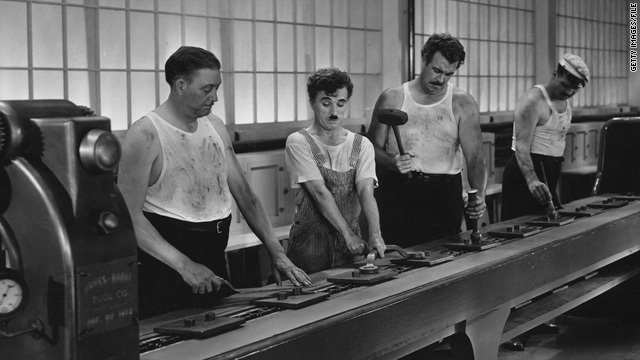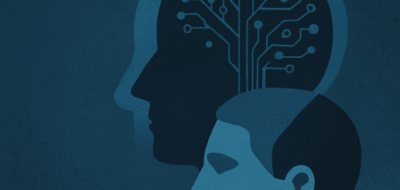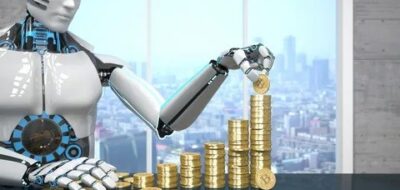Man at assembly line
The film Modern Times starring Charlie Chaplin features a scene showing factory workers struggle to cope with a conveyor belt. Chaplin’s character is one of the workers. Unable to keep up with the production line’s breakneck pace, he ends up trapped in the cogwheels of a monstrous machine. This tragicomical scene offers a simple illustration of concerns surrounding work automation in the early 20th century. The film suggested that the capitalist model reduces workers to the role of an imperfect addition to the manufacturing process. Work of the future.
Similar scenes could well play out in today’s storage rooms of many distribution companies. Yet, they wouldn’t be nearly as dramatic or comical. We would see workers perform tasks to a rhythm set by modern scanners which record human behavior at the conveyor belt and meticulously measure downtime. This is how efficiency improvements and production safety are achieved today. What I find important in this story is that people working at assembly lines may soon become a rare sight. Machines will replace humans in performing the most repetitive jobs. However, this expected robotization and automation of repetitive processes will not be the only or even the most important change that we are likely to see in the future labor market. What will work be like in the future?
Departure from rigid structures
Contemporary trends in organizational design tend to favor loose employee networks and relaxed structures. Even today, companies are gradually abandoning the traditional corporate roles. Modern structures centered around projects will replace rigid chains of command that span across the board from rank-and-file laborers to CEOs. Such changes are driven by the pursuit of efficiency. Managers in companies that sell innovation and new ideas are well aware that project teams generate innovation and ideas more effectively. Teams in such companies are equal in status and created ad hoc with little regard for their members rankings in company hierarchy. Being promoted overnight to project manager is no longer unusual. The key is to be intellectually flexible, creative and imaginative rather than clinging to job descriptions. The ability to adjust to meet new challenges, instantly forge new relationships and resolve problems by thinking out of the box is bound to become the competency most sought after by recruiters.
Skype replacing the office
Even today, an excellent example of progress in working time and workplace flexibility is available. It is the company which owns the WordPress platform. Its employees do not hang out at a coffee machine. No wonder, as they are scattered in dozens of locations around the world and only talk to one another via webcams. There is another example that is much more familiar. The same model has been employed to create the top products of Apple under the arch-management of Steve Jobs. Having been tested on small start-ups, the operating model is now increasingly adopted by corporations employing thousands. The advantage of this work system is the ability it affords to tap into the most creative minds and rare competencies across geographical barriers. Needless to say, the system comes with a cost advantage. Companies stand to derive substantial benefits from granting their manager’s the freedom to negotiate pay with home-based freelancers located somewhere across the globe. According to a McKinsey report, the number of freelancers registered on platforms that list experts for hire will grow by as many as 500 million within the next decade. Recruiters will use such listings to find valuable minds, skills and competencies.
Artificial intelligence to replace excel
As I ponder just how revolutionary our time is, I am reminded of scenes that unfolded at workplaces only a dozen plus years ago. I think of friends telling me about their first encounters with merchandising. Back in the day, people responsible for enticingly displaying goods in stores used to put in dozens of miles a day and write their sales reports by hand. Based on analyses and the expert knowledge acquired with experience, they decided how many cans of a particular beverage to place in a particular store on a given week. The people who started their careers in those early days cannot help but smile with sentiment when reminiscing about them. Who would ever think that the primary tool of a newly-recruited merchandiser would be a smartphone with an app that communicates with systems that help run in-store sales and wholesale operations, forecast turnovers and manage supply chains. The app uses data from such systems to keep sales people up to date on the expected demand for goods, product range seasonality and to recommend modifications where needed. The competitive advantage is not provided by expert knowledge and experience but by having the system itself. This plainest example shows how a sales forecasting application relying on huge quantities of data may become a powerful weapon in the hands of even a novice employee. A few dozen lines of code will relieve the employee of the most toilsome tasks.
We are all pioneers
No one can accurately predict all consequences of labor market transitions. Given the lightning speed of current developments, we are unable to assess the costs and benefits of digitization, robotization and the fading of traditional organization structures fast enough. The biggest optimists claim that robotization and artificial intelligence will enable many to spread their wings. Relieved by modern applications, we will finally be given the time to think creatively, learn knew things and acquire new skills.
Related articles:
– Fall of the hierarchy. Who really rules in your company?
– Technology putting pressure on business – this is what we can expect in 2017 (part 1 of 4)
– A hidden social networks lurks within your company. Find it!
– End of the world we know, welcome to the digital reality
– On TESLA and the human right to make mistakes

Scene from Charlie Chaplin’s movie “Modern Times”










TomK
Good article!
The essence is thought and knowledge.
Getting to know more about ourselves, we pass on this knowledge to AI.
Nano info, neuro-trakers, noosphere, Beasts mediate in acquiring and implementing knowledge.
Norbert Biedrzycki
Automation and Artificial Intelligence will accelerate technical, social and emotional skills in the workforce.
TomK
That is why politician should talk about fundamental change of education system not about taxing robots. The problem is not robotization but that after 16 Y of hard work at school our kids will have to compete with robots as they learn there only what machine can easly do after 2 weeks of being programmed !
TomK
Great analysis and insights
Norbert Biedrzycki
Thank you. Kudos to the team @McK
And99rew
I’m pretty sure that the ratio between job lossed to automation and jobs created by automation is not 1:1. I would respectfully suggest that the losses will significantly outpace the creations.
Norbert Biedrzycki
Per industry, AI’s potential value amounts 1-9% percent of revenue. The value as measured by percentage of industry revenue varies significantly among industries, depending on the specific applicable use cases.
John Accural
Once AI is here, the scene won’t look like a partnership economy with robots living in houses. I created the biggest list of all of their abilities. Even terminator shows what happens. The factories start duplicating factories and a very advanced system begins.
As soon as I create the first one even in virtual reality, even if I have cancer and aren’t yet in my cryo capsule, I will be made immortal in days.
Don Fisher
I would be rather more scared about development of AI. Are we as a humn beeings scared of AI? Do we believe the warnings from people like Prof. Stephen Hawking, Elon Musk and others? Is AI the greatest tool humanity will ever create? It’s not about AI vs. humans. Rather, it’s about creating human Intelligence’: the merger of humans and AI.
Norbert Biedrzycki
http://www.bbc.com/future/story/20161108-weve-got-human-intelligence-all-wrong
….Human language, in contrast, is open-ended. With infinite combinations of words to choose from, we can articulate our deepest feelings or lay down the rules of physics – and if we can’t quite find the right term, we can just invent a new one.
TomK
Robot is a machine capable of carrying out a complex series of actions automatically, especially one programmable by a computer. Robots are already at our desk, helping with small thing and daily duties.
Robots do not need to be feed, paid, don’t need to rest, they only need the appropriate sensors and programming.
500 m people in next 10 years? It’s according to me knowledge 5-7% of total Earth population. Scary
TonyHor
When robots do most jobs the theory that anyone can find a decent job through hard work and study will be proved false.
Legions of unemployed voters will force governments to completely rethink how people get an income, and work will probably become some sort of national service and used as a punishment for criminals.
Norbert Biedrzycki
Professions displaced by new technologies e.g.; automation/robotics, machine laearning, HPC:
– telephone service operators
– microfilm and film careers of all types; photo lab technicians
– typists, secretaries, stenographers
– graphics departments
– check-out clerks diminishing due to automoted check-out lines
– film processors
– train caboose men
– meter readers
– flight booking agents
– newspaper boys – (displaced by adults?)
– photo-typositors and typesetters generally
– toll booth collectors – slowly going away
– real estate agents – change services/model to remain viable???
– HR recruiters – social media and online sites replacing them?
– Production workers displaced by robots and automation
– in-home telephone repair completely and telephone repair generally
– small business appliance repair
– book binders
– book store owners
– print encylopedia personnel
– career waiters
– Cartographer
– Yellow Page ad salesperson
– Stockbroker
– Higher education programs, delivery models, degree awarding institutions
– Bible copying monks were displaced by the printing press
– Mattress makers
– Automobile and assembly line workers
– Printers and copy shop clerks
– Mail carriers
– Insurance agents
CaffD
But I need to admit – interesting article
Norbert Biedrzycki
Thank you
DDonovan
AI: The robots are coming and if the forecasts are correct, they could replace millions of jobs. In recent years, automation has become increasingly visible. I see it even in a store near my. Future is coming
CaffD
Oh please… There was time when 99% of all employment was in agriculture. In the UK it is now approximately 1%. We now have countless different types of jobs that were previously unimaginable. The same will happen when we have increased automation in other fields.
Imagine if no-one had to work on anything we do now because robots could do it all. That would free us up to do so many wonderful things. Imagine schools with class sizes of no more than 6 and specialist teachers for every subject. 24/7 care for all elderly and sick people. We will never run out of wants and desires so there will always be work available for everyone who wants it.
Norbert Biedrzycki
Hope you are right. But imagine according to McKinsey 300 mln people loosing their jobs in 3 years due to introduction of new technologies. Social impact of this would be tremondus
JohnE3
People are all given “nice” jobs, usually in an office and with little actual work to do. They import much of the stuff of life, even food. The only real jobs are education and health care, which are harder to automate. But eduction is not as demanding because whether smart or dumb, you are taken care of. And for the low-skills tasks you import people from far away, like India. Of course we still have a few engineers to oversee. But more often they will be supervising robots than humans.